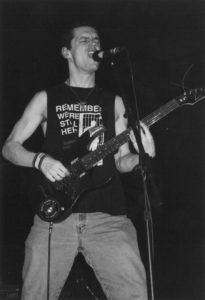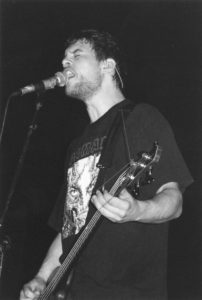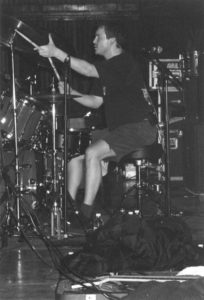
In February of 2001, Propagandhi released their third full-length, Today’s Empires, Tomorrow’s Ashes. The following month, they played the Congress Theater and we met up with the band before the show. We spoke with singer/guitarist Chris Hannah, bassist Todd Kowalski and drummer Jord Samolesky, and talked about the record’s style and some of its lyrical content. We addressed topics like artificial borders, the prison system in the U.S., the departure of founding singer/bassist John K. Samson and more. Without question, Propagandhi is one of the most influential punk bands of the last 30 years and with each record they continue to progress their sound. Today’s Empires, Tomorrow’s Ashes represents a pivotal point in the band’s history and it was definitely exciting to interview them just after the album came out.
Bill – What’s it like to be touring again in the U.S. for the first time in several years?
Jord – It’s hard to say. It’s only been two days and this is the second show tonight, but hectic so far.
Chris – Given the context of the new record, hopefully we’re not misrepresenting ourselves and people aren’t getting the wrong idea, like that we’re Canadians pointing our fingers at Americans.
Bill – Who came up with the idea for the Humanitarian Intervention Tour and was it something you were initially interested in doing?
Chris – Fat Mike proposed it to us and we were sort of lukewarm towards it at first because we’ve never really toured like this before. We were a little hesitant, but then we were mildly excited about just getting the U.S. part done with a bunch of bands.
Jord – We sort of owe Fat a little bit too for being so patient with all the setbacks with this new record.
Chris – It’s sort of a gesture.
Todd – And we’re good friends with J Church and stuff.
Jord – I guess the “Humanitarian Intervention” name is just to kind of like get around the rhetoric of all this humanitarian intervention bullshit that’s propagated by the government and corporate media in North America. With things like Iraq and Serbia, which are essentially non-humanitarian, big business operated, military, fuckin’ genocidal pieces of shit warfare. So fuck, let that be fuckin’ told.
Bill – You kind of touched on this before, but what were some of the factors that caused the new record to be pushed back from its original release date? Also, are you pleased with the finished product now that the record is done?
Jord – To give a very brief timetable, Todd joined the band when we were still supporting the Less Talk… record and we had to take a little break to relearn some of the stuff with him and finish up a couple tours. Then we started to establish our record label, G7 Welcoming Committee, which took more time than originally anticipated. Then we got down to seriously working on the tunes, and when we started setting recording dates it just, there was all kinds of crazy shit that pushed it back. Everything from broken ankles to fuckin’ whatever.
Chris – But yeah, it came out very close to how we envisioned it, so we’re quite pleased.
Jord – And the CD-ROM part of it turned out really good too. We were super-happy with that.
Bill – Who’s decision was it to include that with the album?
Chris – It all just kind of evolved when we learned you could actually do that. We thought, “Why not stick some shit on there?” In some ways it was difficult to put all of that together, but I found that if you can build a website, you’d probably have no problem authoring a CD-ROM, even though I didn’t do the authoring.
Bill – This new album definitely has a harder-edge to it compared to your last two full-lengths. Would you say that’s a result of John leaving the band or was it an unconscious occurrence?
Chris – It was both unconscious and conscious. I mean, just the logical product of these three people who grew up listening to ‘80s hardcore, which is much more aggressive than ‘90s punk rock. If you put people like that together in the same band, who share the same passion for that kind of music, then you’re going to get something that reflects that. It’s the first record we’ve done that I’m actually really proud of.
Jord – I think this record is the closest to what we try to idealize, given the convenience of Todd now being in the band and having him be closer to both mine and Chris’s musical and cultural interests, as compared to what we had with previous members. I think this is the first thing we’ve done that’s really close to what our original intent was.
Bill – I’ve heard a lot of different stories about this matter, but did John leave the band on good terms or was his departure controversial?
Chris – It was obvious that the three of us weren’t compatible as musicians.
Jord – His songwriting is better represented now in The Weakerthans.
Chris – And ours is way better represented with Todd, so it worked out for everybody. But as far as those rumors go, he moves in different circles, so it’s hard to say how he feels about it.
Todd – Like you said Chris, they’re the artists and we’re the skids, (laughs).
Bill – The lyrical content and political views displayed on the new album seem a bit less blatant than what’s present on Less Talk, More Rock. What’s the reason for this?
Chris – I think maybe just the style is a bit more evolved from where it was. I think it’s a little more thoughtful. I mean, we put a little more effort into it I think. We used the CD-ROM to contextualize the lyrics so that the impact would be greater, and I think it’s by far the most political record we’ve ever put out. I don’t know if that’s what other people think or not.
Bill – There’s a quote inside the booklet of the new album that deals with your feelings regarding young Americans and their potential to still do good in today’s world, and also a section of the Enhanced CD where you discuss this topic. Can you tell me a little more about your thoughts on this?
Chris – I guess the quote there is to sort of clarify that when we as a band are critiquing the U.S. establishment, it’s got nothing or little to do with citizens, and that people have the power to change government. People have the power to change their society and the institutions that represent them across the world, whether it’s in the U.S. or in Canada. Like in our country, our government does fuckin’ brutal things, like it’s this alleged peacekeeping country. But if people mobilize to actually make sure these institutions reflect humane and real democratic values, instead of just fuckin’ talking about it like it means nothing, then things will change. The quote was there in hopes of people understanding that the message of the record was a positive one, not just a negative, finger-pointing one.
Jord – I think the first step in that is generating some kind of political-consciousness, because I think if people actually knew what their government was doing, they’d be fuckin’ pissed off to know that almost half of their tax dollars are going towards concessions to arms manufacturers and getting arms out to dictators all over the world, and just being this big profit-making system. For that and also how they continue to expand this empire, which has nothing to do with democracy. It’s all about money and control. It’s the continuation of the neocolonialist empire, which has been going on for hundreds and hundreds of years, and has now manifested in the U.S. establishment.
Chris – The fundamental and proclaimed values of American society are good. The pursuit of liberty and democracy and that sort of thing, but that’s all being stolen by concentrations of power who are using that power to maintain it through crushing any move toward socializing or creating a society that’s for people instead of profit.
Bill – The lyrics to the song “Back to the Motor League” to some extent convey a disliking for the bullshit that goes on in both the punk rock scene and in mainstream music. Is this what you’re trying to get across in that song and if so, could you elaborate on that?
Chris – That’s what we’re trying to say, but I don’t know if there’s much need for elaboration. The Motor League is this place where I used to work and make maps, answer phones and send out tow trucks. It fuckin’ sucked. The point of the song is just that at some points you’re so disappointed with this culture you’ve grown up in that you’d rather go back to this terrible fuckin’ job and endure that instead of enduring reality.
Bill – Issues involving borders and really just the word “border” comes up very often in your writing. Why do you feel this topic is so important?
Todd – I guess because people think that as soon as you cross the border everyone becomes subhuman.
Chris – Out of like a Western, industrialized country into like a second or third world country, suddenly there’s delineation between the value of a human being. It’s just fucked up.
Todd – Like somebody was saying that if you love your country then it means that you love the landscape and the people and all that, but then does the landscape get worse as soon as you cross the border or do the people get any worse?
Jord – They’re artificial borders that obviously haven’t existed until people came up with the grand idea of creating them to basically control populations. At this point, capital moves freely with no regard for borders. If you can divide places up into where labor is cheaper in certain places, where the people there don’t really have rights of any kind and are unable to move anywhere else…I don’t know. It’s a mess.
Bill – Several of the new songs also deal with America’s overcrowded jail system and excessive prison sentences for non-violent crimes. What negative effects do you perceive these problems having on the U.S. or in any country for that matter?
Jord – It’s just another instrument of social control. If you can make something like marijuana illegal and use that as a pretext to fill jails full of people so that people can make money off of building more prisons and potentially to create a new, super-cheap source of labor, then that’s just fucked. Like this is getting into stuff the USSR did in the 1940s and ‘50s. The most people in prison per-capita in the world exist in this country that’s supposed to be about freedom and justice. It’s like let the true colors be shown once again.
Todd – There’s the least amount of free people in the world here in the U.S.
Bill – Do you think bands like Anti-Flag or Fifteen make valid political claims or do you not agree with a lot of what they say?
Chris – I probably would agree with them I think, but I’ve never really heard any of those bands, so I really couldn’t comment on what they say or anything like that.
Todd – I like this one Fifteen record I heard, but I don’t remember what it was called.
Bill – Many of your fans’ favorite record is probably How to Clean Everything, but I’ve read that you’re basically embarrassed of that album and pretty much hate it. If that’s true, why do you feel that way?
Chris – Not anymore. It’s like the farther you get away from something then the easier it is to be a little more easygoing about it. You’re less obsessed or involved in it. It’s so distant now anyway that it’s just like whatever.
Bill – Tell me about the last time you guys played in Chicago six years ago.
Chris – It was in some basement. I can’t really remember it. It was just a bad situation and we ended up playing a basement show with like 50 kids and then we left.
Bill – What do your parents think of your band?
Chris – They don’t like the music and they don’t really like the lyrics. They like me though, so it works out in the end.
Bill – Do you guys get a lot of hate mail?
Chris – Way more positive mail than hate mail. Maybe once every six months we’ll get a piece of hate mail. Like a lot of letters, the positive letters usually have some criticisms, but people should have criticisms. They should be asking questions and be critical of things they don’t believe in or understand. But overall, it’s definitely not hateful-type mail.
Bill – What drives you to keep playing in this band?
Chris – I guess the passion for the kind of music we’re playing. We just love music. And I think our transformation from when we were 15-year-old kids who were going to shows and not listening to lyrics and diving on people’s heads, that eventually some of the messages sunk-in and we moved on as people and evolved. It drives me when I get responses, whether it’s e-mail or mail, with people saying the same thing, and I’m seeing that we’re passing the same courtesy on to younger people. For me that’s like the ultimate goal in life.
Bill – What’s your proudest moment as a member of Propagandhi?
Chris – Are there any? (Laughs). I guess I’d just say finishing the new record, because like I said it was the first thing we’d ever done that I felt proud of.
Bill – Do you feel like your music has made a difference in the world?
Chris – That’s a tough question because you have to consider scale, like at what scale does a difference make a difference? But I think certainly in small scales, like people who are responding and giving me feedback. It seems at least for some individuals that some positive differences have been made in their lives.
Bill – Any additional comments?
Chris – Anybody who has internet access and wants to check out the best source of progressive journalism and activism on the net should go to www.zmag.org.












